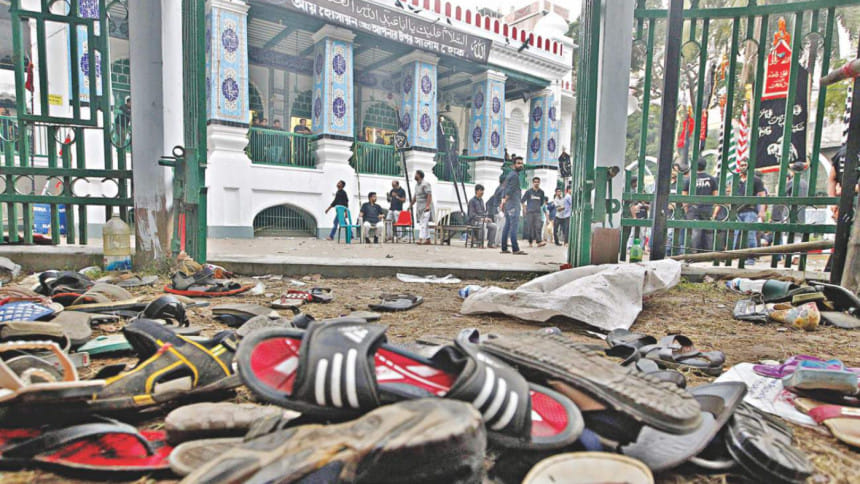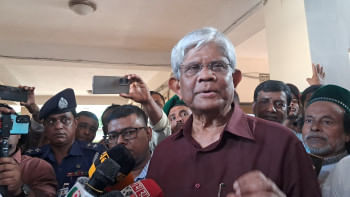All in the name of God?

Last week I was appalled and deeply saddened to read about the bomb attacks on the peaceful Ashura procession at the Hussaini Dalan in Dhaka. Whoever the assailants may have been, I am at a loss to understand which religious ideology teaches people to follow the path of violence and aggression rather than that of compassion and tolerance. Do the perpetrators really believe that they can protect and propagate Islam by spreading the seeds of hatred between the Shias and the Sunnis, rather than by healing past wounds through empathy and kindness?
As I read the gory details of the attack, my mind travelled back in time…I was barely seven years old when I accompanied my grandmother to Hussaini Dalan on the tenth of Muharram to attend a congregation in remembrance of the tragic events surrounding the death of Imam Husain and his family. The history of the battle of Karbala was unknown to me at the time. I remember a woman in black narrating the story about the brutal killing of Imam Husain. As she recounted the horrifying tale with passion and fervour, many women in the gathering wept. Although I did not understand much of the narrative, the emotional rendition touched me to my core. I nestled close to Dadima (as I called my grandmother) who sat in a corner reciting dua, while rotating her prayer beads.
On the way back, I asked Dadima to tell me the story of Karbala. She explained it simply and concisely: It was a battle between the prophet's grandson, Imam Husain, and Yezid – the tyrant who had deceitfully usurped the Islamic Caliphate. Imam Husain and his followers were outnumbered and cut off from the River Euphrates – the only source of water. On the tenth day of the battle, the Imam was humiliated and beheaded by Yezid's men. Most of his supporters and family were killed, including his infant son who was denied a drink of water until the very end. I could vaguely connect the dots, but understood that it was a clash between good and evil: with evil winning in this case.
Many of you may be wondering why Dadima took her seven-year-old granddaughter to a gloomy gathering of mourners. Modern psychologists and educationists may even frown at the idea of exposing a child to the trauma of a tragedy that occurred hundreds of years ago and was in no way connected to her life. However, looking back at the incident I am convinced that this was one of the most poignant lessons my grandmother taught me. It was not a lesson about religion, but about life. Dadima never went to college neither did she read lofty books on secularism. Yet she told me the story of Karbala in the most humane and non-partisan way possible. There was no mention of Shias or Sunnis or Islam. Her emphasis was on the moral aspects: That one must be fair in dealing with one's enemies and be kind to children and the weaker foe.
Much later in life I learned about the "great divide" between Shias and Sunnis, and discovered that we were Sunnis. It never occurred to me to ask my grandmother why she, a devout Sunni, participated in a Shia ritual. I accepted it as the right thing to do -- just as it is right to show empathy for the victims of any tragedy.
Today, I realise how fortunate I am that my religious education was from a woman who was not only compassionate and tolerant, but also wise and free from bigotry. Through her simple interpretation of Ashura, she taught me the importance of standing up for one's principles in the face of insurmountable odds. And, by choosing not to cast the episode as a Shia-Sunni rift, she made me realise that human suffering is more important than any sectarian divide.
Sitting here in the United States – miles away from the tragedy in Hussaini Dalan – I sympathise with the victims and condemn this dastardly act. However, there is one more thing I promise to do at a personal level. I will pass on Dadima's legacy by narrating the story of Karbala to my grandchildren, the same way she narrated it to me. I will explain to them that there are no Shias, Sunnis, Wahabis, Hindus, Jews or Christians in this story. There are only human beings – and there are just two sides: right and wrong. And it is wrong to kill in the name of God and religion because every human life is created by Him and is therefore precious.
I wonder if my grandmother realised years ago that by instilling in me this sense of right and wrong, she was passing on her principles of tolerance and compassion to her future generation!
The writer is a renowned Rabindra Sangeet exponent and a former employee of the World Bank.

 For all latest news, follow The Daily Star's Google News channel.
For all latest news, follow The Daily Star's Google News channel. 



Comments